Unit 1 Lesson 2 It's Getting Warmer!上课课件+嵌入音频(共19张PPT)
文档属性
| 名称 | Unit 1 Lesson 2 It's Getting Warmer!上课课件+嵌入音频(共19张PPT) |
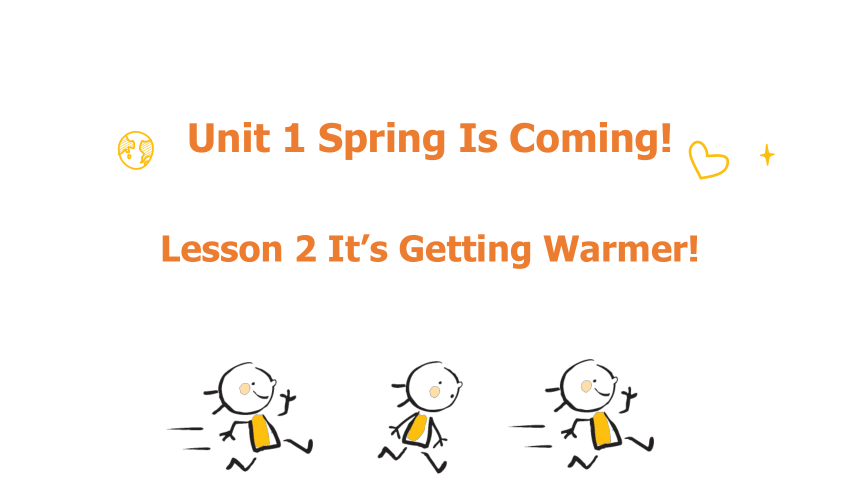
|
|
| 格式 | zip | ||
| 文件大小 | 3.1MB | ||
| 资源类型 | 教案 | ||
| 版本资源 | 冀教版 | ||
| 科目 | 英语 | ||
| 更新时间 | 2022-02-20 10:14:35 | ||
图片预览

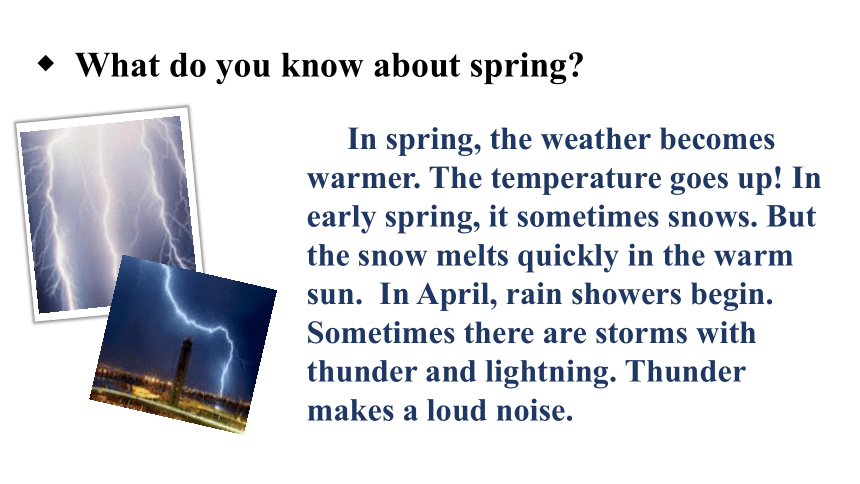
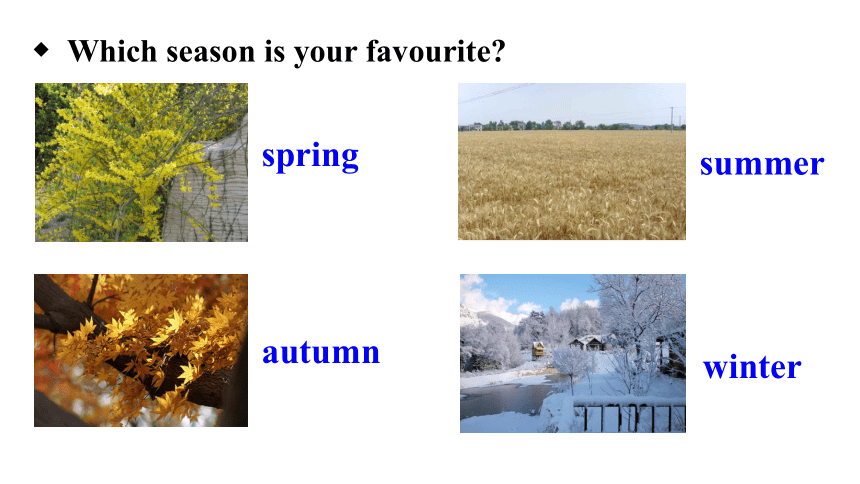
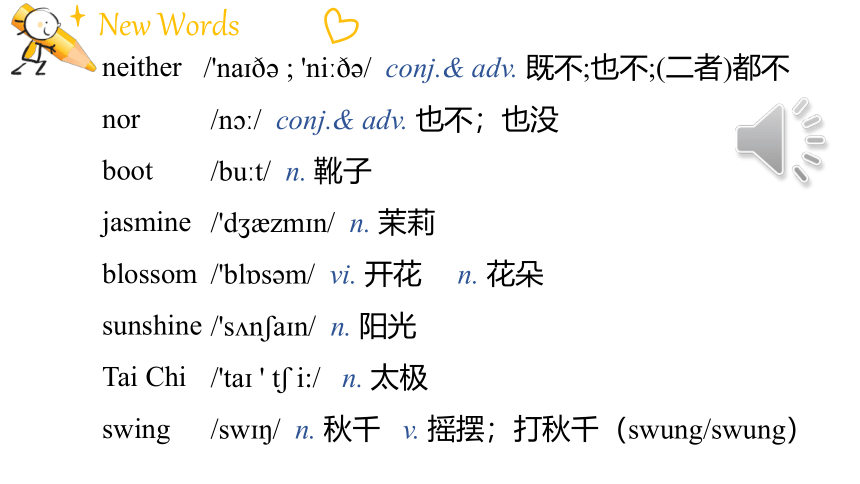

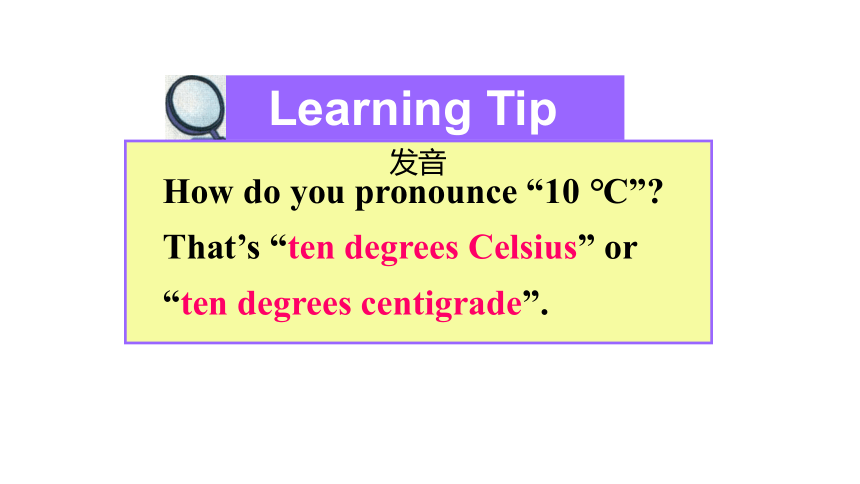
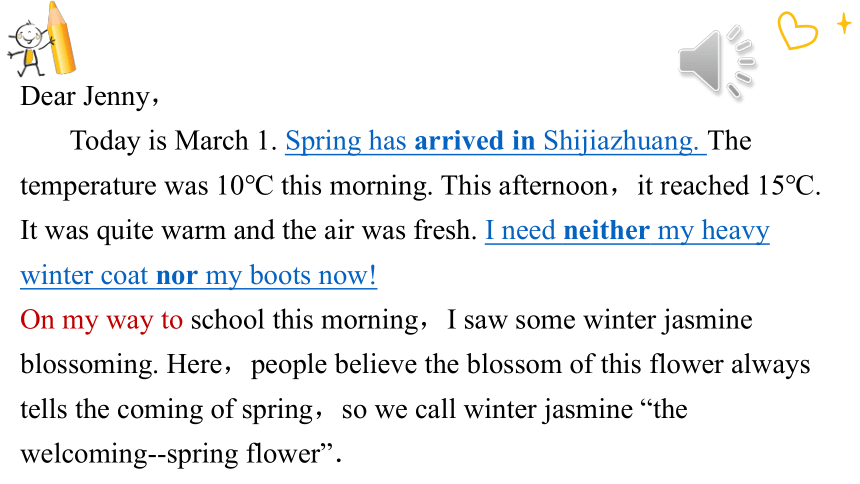
文档简介
(共19张PPT)
Unit 1 Spring Is Coming!
Lesson 2 It’s Getting Warmer!
◆ What do you know about spring
In spring, the weather becomes warmer. The temperature goes up! In early spring, it sometimes snows. But the snow melts quickly in the warm sun. In April, rain showers begin. Sometimes there are storms with thunder and lightning. Thunder makes a loud noise.
spring
summer
◆ Which season is your favourite
autumn
winter
neither
nor
boot
jasmine
blossom
sunshine
Tai Chi
swing
New Words
/'na ; 'ni / conj.& adv. 既不;也不;(二者)都不
/n / conj.& adv. 也不;也没
/bu t/ n. 靴子
/'d zm n/ n. 茉莉
/'bl s m/ vi. 开花 n. 花朵
/'s n a n/ n. 阳光
/'ta ' t i:/ n. 太极
/sw / n. 秋千 v. 摇摆;打秋千(swung/swung)
1. Lucy and Lily are twins and ________(都不) of them likes fish.
2.I get a pair of red ________(靴子) on my birthday.
3.The leaves are _________(摇摆) in the wind.
4.I can’t open my eyes in the strong _________ (阳光).
5.We saw some winter jasmine _________ (开花) in the park.
neither
boots
swinging
sunshine
Fill in the blanks.
blossoming
Learning Tip
How do you pronounce “10 ℃”
That’s “ten degrees Celsius” or “ten degrees centigrade”.
发音
Dear Jenny,
Today is March 1. Spring has arrived in Shijiazhuang. The temperature was 10℃ this morning. This afternoon,it reached 15℃. It was quite warm and the air was fresh. I need neither my heavy winter coat nor my boots now!
On my way to school this morning,I saw some winter jasmine blossoming. Here,people believe the blossom of this flower always tells the coming of spring,so we call winter jasmine “the welcoming- spring flower”.
The days are getting longer and the sun rises earlier in the morning. The warm sunshine feels good after the cold winter days. Every morning,I see lots of people exercising in the park. Some practice Tai Chi. Others sing and dance. Children run around or play on the swings.
We will have a school basketball game next week. My class is also planning a field trip to the countryside. We will plant trees,enjoy the beautiful flowers and play games. Wow!I can’t wait.
What’s the weather like in Canada?What do you like to do in spring
Wang Mei
Read the lesson and write true(T)or false(F).
1.The temperature reached 15℃ in the morning. ( )
2.Wang Mei is still wearing boots. ( )
3.Wang Mei saw some winter jasmine on her way to
the park. ( )
4.Wang Mei’s class is planning a field trip to the
countryside. ( )
Let's Do It !
F
F
F
T
2) Read the lesson again and tick all the scenes mentioned.
□The grass grows.
□The weather is warm.
□The air is fresh.
□The flowers blossom.
□The trees begin to sprout(发芽).
□The days get longer.
□The sun rises earlier.
□The birds fly back from the south.
√
√
√
√
√
1.When I ________that village,it was dark.
2.It is getting warm. Many people like to _______Tai Chi in the park.
3.The flowers in the park have blossomed. My grandparents go there to ___________the flowers every morning.
4.The sun ____ early now. Let’s get up early and play ping pong together.
5.Many people go to the countryside to________ trees in early spring.
3)What do people like to do in spring?Fill in the blanks with the correct forms of the words in the box.
reached
practice
enjoy
reach enjoy rise practice plant
rises
plant
1.Seeing their teacher ____ into the classroom, they stopped _____ at once.
A. walk; telling B. entering; to speak
C. enter; to tell D. walking; talking
2. When I walked past the park, I saw some old people ____ Chinese Tai Chi.
A. do B. did C. doing D. are doing
3. I have two sisters, but ____ of them is a teacher.
A. all B. neither C. both D. none
D
C
B
4. — Which do you prefer, a CD player or a Walkman(随身听)
— ____. I prefer a portable computer.
A. Both B. Either C. None D. Neither
5. — Which do you prefer, rice or noodles
— ____, thanks. I am not hungry, I only need some water.
A. Neither B. Either C. Both D. All
6. — Would you like some juice or coffee
— ____. I like green tea instead.
A. Either B. Neither C. Both
A
B
D
1.Spring has arrived in Shijiazhuang.
石家庄的春天已经到了。
arrive in… 到达某地,通常指到达较大的地方。
到达较小的地方用arrive at…。
e.g. 下周他们将到达那个城市。
e.g. 他们昨天到达了我们学校。
They will arrive in that city next week.
They arrived at our school yesterday.
辨析:arrive , get to , reach
到
达
arrive 作不及物动词,后接地点名词时要省略in或at
get to 后接表示地点的副词时需去掉介词to
reach作及物动词,后面直接加表示地点的名词
Back
2.I need neither my heavy winter coat nor my boots now!
我现在既不需要穿我的厚外套也不需要穿我的靴子!
neither. . . nor 既不……也不
not only. . . but also. . . 不仅……而且……
either. . . or. . . 或者……或者……
both. . . and. . . ……和……(两者)都
就近原则
E.g.他和他父母都不在家。
Neither his parents nor he
is at home.
Both his parents and he
are at home.
考向一
She likes ______________________________.
她既不喜欢苹果也不喜欢橘子。
He is __________________________________.
他既不聪明也不勤奋。
Neither my parents nor I ____ at home yesterday.
昨天我父母和我都不在家。
neither apples nor oranges
neither clever nor hardworking
was
Exercise
考向二
neither的用法
作代词,意为“(两者)都不……”,neither在句中作主语时,常与of连用,谓语动词常用单数形式。 —Do you like Zhang Jie or Deng Ziqi?
你喜欢张杰还是邓紫棋?
—Neither. 都不喜欢。
Neither of them knows me. 他们两个都不认识我。
作副词,意为“也不”常用于句首,表示前面的否定情况也适用于后者,而且句子须用倒装语序。 —He doesn’t like fast food at all.
他一点儿也不喜欢快餐。
—Neither does Lily.
莉莉也不喜欢。
Back
3. Every morning, I see lots of people exercising in the
park. 每天早上,我看到很多人在公园里锻炼。
see sb doing sth 看见某人正在做某事
(强调动作正在发生)
see sb. do sth 看见某人做了某事
(强调动作经常发生或看到动作发生的整个过程)
e.g.我看到一些女孩正在树下跳舞。
I saw some girls dan cing under the trees.
e.g.我经常看到李明在操场上打篮球。
I often see Li Ming play basketball on the playground.
Back
Unit 1 Spring Is Coming!
Lesson 2 It’s Getting Warmer!
◆ What do you know about spring
In spring, the weather becomes warmer. The temperature goes up! In early spring, it sometimes snows. But the snow melts quickly in the warm sun. In April, rain showers begin. Sometimes there are storms with thunder and lightning. Thunder makes a loud noise.
spring
summer
◆ Which season is your favourite
autumn
winter
neither
nor
boot
jasmine
blossom
sunshine
Tai Chi
swing
New Words
/'na ; 'ni / conj.& adv. 既不;也不;(二者)都不
/n / conj.& adv. 也不;也没
/bu t/ n. 靴子
/'d zm n/ n. 茉莉
/'bl s m/ vi. 开花 n. 花朵
/'s n a n/ n. 阳光
/'ta ' t i:/ n. 太极
/sw / n. 秋千 v. 摇摆;打秋千(swung/swung)
1. Lucy and Lily are twins and ________(都不) of them likes fish.
2.I get a pair of red ________(靴子) on my birthday.
3.The leaves are _________(摇摆) in the wind.
4.I can’t open my eyes in the strong _________ (阳光).
5.We saw some winter jasmine _________ (开花) in the park.
neither
boots
swinging
sunshine
Fill in the blanks.
blossoming
Learning Tip
How do you pronounce “10 ℃”
That’s “ten degrees Celsius” or “ten degrees centigrade”.
发音
Dear Jenny,
Today is March 1. Spring has arrived in Shijiazhuang. The temperature was 10℃ this morning. This afternoon,it reached 15℃. It was quite warm and the air was fresh. I need neither my heavy winter coat nor my boots now!
On my way to school this morning,I saw some winter jasmine blossoming. Here,people believe the blossom of this flower always tells the coming of spring,so we call winter jasmine “the welcoming- spring flower”.
The days are getting longer and the sun rises earlier in the morning. The warm sunshine feels good after the cold winter days. Every morning,I see lots of people exercising in the park. Some practice Tai Chi. Others sing and dance. Children run around or play on the swings.
We will have a school basketball game next week. My class is also planning a field trip to the countryside. We will plant trees,enjoy the beautiful flowers and play games. Wow!I can’t wait.
What’s the weather like in Canada?What do you like to do in spring
Wang Mei
Read the lesson and write true(T)or false(F).
1.The temperature reached 15℃ in the morning. ( )
2.Wang Mei is still wearing boots. ( )
3.Wang Mei saw some winter jasmine on her way to
the park. ( )
4.Wang Mei’s class is planning a field trip to the
countryside. ( )
Let's Do It !
F
F
F
T
2) Read the lesson again and tick all the scenes mentioned.
□The grass grows.
□The weather is warm.
□The air is fresh.
□The flowers blossom.
□The trees begin to sprout(发芽).
□The days get longer.
□The sun rises earlier.
□The birds fly back from the south.
√
√
√
√
√
1.When I ________that village,it was dark.
2.It is getting warm. Many people like to _______Tai Chi in the park.
3.The flowers in the park have blossomed. My grandparents go there to ___________the flowers every morning.
4.The sun ____ early now. Let’s get up early and play ping pong together.
5.Many people go to the countryside to________ trees in early spring.
3)What do people like to do in spring?Fill in the blanks with the correct forms of the words in the box.
reached
practice
enjoy
reach enjoy rise practice plant
rises
plant
1.Seeing their teacher ____ into the classroom, they stopped _____ at once.
A. walk; telling B. entering; to speak
C. enter; to tell D. walking; talking
2. When I walked past the park, I saw some old people ____ Chinese Tai Chi.
A. do B. did C. doing D. are doing
3. I have two sisters, but ____ of them is a teacher.
A. all B. neither C. both D. none
D
C
B
4. — Which do you prefer, a CD player or a Walkman(随身听)
— ____. I prefer a portable computer.
A. Both B. Either C. None D. Neither
5. — Which do you prefer, rice or noodles
— ____, thanks. I am not hungry, I only need some water.
A. Neither B. Either C. Both D. All
6. — Would you like some juice or coffee
— ____. I like green tea instead.
A. Either B. Neither C. Both
A
B
D
1.Spring has arrived in Shijiazhuang.
石家庄的春天已经到了。
arrive in… 到达某地,通常指到达较大的地方。
到达较小的地方用arrive at…。
e.g. 下周他们将到达那个城市。
e.g. 他们昨天到达了我们学校。
They will arrive in that city next week.
They arrived at our school yesterday.
辨析:arrive , get to , reach
到
达
arrive 作不及物动词,后接地点名词时要省略in或at
get to 后接表示地点的副词时需去掉介词to
reach作及物动词,后面直接加表示地点的名词
Back
2.I need neither my heavy winter coat nor my boots now!
我现在既不需要穿我的厚外套也不需要穿我的靴子!
neither. . . nor 既不……也不
not only. . . but also. . . 不仅……而且……
either. . . or. . . 或者……或者……
both. . . and. . . ……和……(两者)都
就近原则
E.g.他和他父母都不在家。
Neither his parents nor he
is at home.
Both his parents and he
are at home.
考向一
She likes ______________________________.
她既不喜欢苹果也不喜欢橘子。
He is __________________________________.
他既不聪明也不勤奋。
Neither my parents nor I ____ at home yesterday.
昨天我父母和我都不在家。
neither apples nor oranges
neither clever nor hardworking
was
Exercise
考向二
neither的用法
作代词,意为“(两者)都不……”,neither在句中作主语时,常与of连用,谓语动词常用单数形式。 —Do you like Zhang Jie or Deng Ziqi?
你喜欢张杰还是邓紫棋?
—Neither. 都不喜欢。
Neither of them knows me. 他们两个都不认识我。
作副词,意为“也不”常用于句首,表示前面的否定情况也适用于后者,而且句子须用倒装语序。 —He doesn’t like fast food at all.
他一点儿也不喜欢快餐。
—Neither does Lily.
莉莉也不喜欢。
Back
3. Every morning, I see lots of people exercising in the
park. 每天早上,我看到很多人在公园里锻炼。
see sb doing sth 看见某人正在做某事
(强调动作正在发生)
see sb. do sth 看见某人做了某事
(强调动作经常发生或看到动作发生的整个过程)
e.g.我看到一些女孩正在树下跳舞。
I saw some girls dan cing under the trees.
e.g.我经常看到李明在操场上打篮球。
I often see Li Ming play basketball on the playground.
Back
同课章节目录
- Unit 1 Spring Is Coming
- Lesson 1 How's the weather?
- Lesson 2 It's Getting Warmer!
- Lesson 3 Sun Is Rising
- Lesson 4 The Spring City
- Lesson 5 Babysitting on a Spring Day
- Lesson 6 Stories about Spring
- Unit 2 Plant a Plant
- Lesson 7 Planting Trees
- Lesson 8 Why Are Plants Important?
- Lesson 9 Gardening with Mary
- Lesson 10 Make Your Garden Grow!
- Lesson 11 Amazing Plants
- Lesson 12 Danny's Plant
- Unit 3 Animals Are Our Friends
- Lesson 13 Danny's Big Scare
- Lesson 14 Amazing Animals
- Lesson 15 The Zoo Is Open
- Lesson 16 The Pear Escaped
- Lesson 17 Save the Tigers
- Lesson 18 Friendship Between Animals
- Unit 4 The Internet Connects Us
- Lesson 19 How Do You Use the Internet?
- Lesson 20 A Computer Helps!
- Lesson 21 Books or Computers?
- Lesson 22 Travel on the Internet
- Lesson 23 The Internet--Good or Bad?
- Lesson 24 An E-mail to Grandpa
- Unit 5 Buying and Selling
- Lesson 25 Raising Money
- Lesson 26 Cookies, Please!
- Lesson 27 Business English
- Lesson 28 Ms. Liu's Great Idea
- Lesson 29 How to Push a Product
- Lesson 30 A Cookie Sale
- Unit 6 Be a Champion!
- Lesson 31 Don't Fall, Danny
- Lesson 32 My Favourite Record
- Lesson 33 2800 Years of Sports
- Lesson 34 Modern Olympics
- Lesson 35 The Dream Team
- Lesson 36 Classroom Olympics
- Unit 7 Know Our World
- Lesson 37 Let's Learn Geography!
- Lesson 38 The World Is a Big Place
- Lesson 39 Ring Up or Call?
- Lesson 40 Body Language
- Lesson 41 A Class of the World
- Lesson 42 North America
- Unit 8 Save Our World
- Lesson 43 Let's Clean Up!
- Lesson 44 Environment Clubs
- Lesson 45 Let's Sort Garbage!
- Lesson 46 Protect Our Environment
- Lesson 47 Connected to Nature
- Lesson 48 Garbage Is Interesting!
